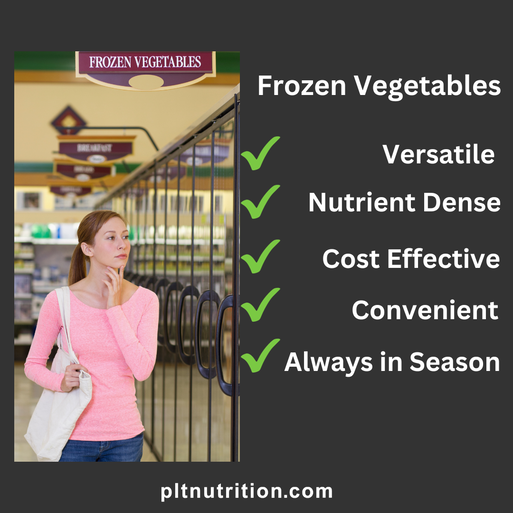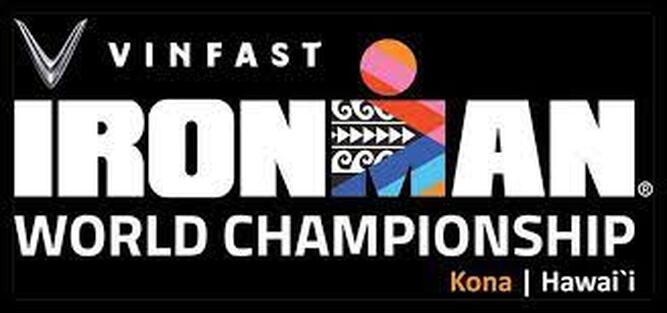|
Some of the most common questions people ask when considering a PLT Nutrition Coaching Plan are:
Q: Will I have to spend hours in the kitchen cooking elaborate meals from complicated recipes? Q: We have a large family and so budget is important when grocery shopping, do I need to buy all organic, fresh produce etc.? Q: I don’t like (or know how to) cook, will you help me with some simple ideas? At PLT, we encourage our clients to eat the foods they love AND to gradually improved the quality of their food choices. We talk about SIMPLE FOOD often, heck if you search #simplefood in the PLT Community, you will be inundated with meal/recipe ideas that will definitely NOT stress you out in the kitchen. A very basic recommendation for all:
Whilst fresh is awesome and you should definitely include some fresh veggies weekly if you can, many people find that they are constantly throwing away produce that has gone bad - we all dislike food waste and wasting our hard earned cash! Don’t turn your nose up at frozen please. Frozen vegetables offer several benefits that make them a convenient and nutritious option. Whether you are cooking for 1 or a family of 15, some important things to consider about the wall of veg in the frozen food department: Nutrient Retention: Frozen vegetables are often frozen shortly after harvesting, locking in their nutritional content. This process helps preserve essential vitamins, minerals, and antioxidants, ensuring that they remain available for consumption. Long Shelf Life: Frozen vegetables have a longer shelf life compared to fresh produce. This extended shelf life allows for convenient storage, reducing the risk of food waste. You can keep a variety of frozen vegetables on hand, making it easier to incorporate them into your meals regularly. Convenience: Frozen vegetables are incredibly convenient. They come pre-washed, pre-cut, and ready to use, saving you time on preparation. This convenience can be especially helpful for busy individuals or those with hectic schedules. Year-Round Availability: Frozen vegetables are available year-round, regardless of seasonal variations. This ensures a consistent and diverse supply of vegetables, allowing you to maintain a well-balanced diet throughout the year. Cost-Effective: Frozen vegetables are often more cost-effective than fresh produce, making them a budget-friendly option for those looking to maximize nutritional value without breaking the bank. Buying in bulk can further enhance cost savings. Reduced Food Waste: Frozen vegetables help reduce food waste since you can use only the amount you need and store the rest for later. This contrasts with fresh produce, which may have a shorter shelf life and be more susceptible to spoilage. Texture and Taste: The freezing process helps maintain the texture and taste of many vegetables. While some may soften slightly upon cooking, the overall quality is often comparable to fresh alternatives. Versatility: Frozen vegetables are versatile and can be easily incorporated into a variety of dishes. Whether you're adding them to yummy bowls, stir-fries, egg dishes, or side dishes, frozen vegetables provide flexibility in meal preparation. Availability of Mixes and Blends: Many frozen vegetable mixes and blends are available, combining different vegetables for added variety and convenience. These mixes can be tailored to specific recipes or preferences. Nutrient Density: Despite common misconceptions, frozen vegetables can be as nutrient-dense as, or even more so than, fresh vegetables that have been stored for an extended period. The quick freezing process helps preserve the vegetables at their peak nutritional state. Simple is best. Simple needn't be boring. Simple can be very budget friendly. Melissa Hoffman joined PLT Nutrition initially with the goal of fat/weight loss. This is a challenging process for someone with her HIGH level of endurance training and requires a slow delicate process. During her LIVE video Meet & Greet call she discussed her goals with Coach Katie and that she was training for a 70.3 Half Ironman so they agreed a plan focused on a minimal deficit to allow for slow and controlled progress whist also supporting her Ironman training. Just prior to her plan starting she heard the AMAZING news that she has qualified for the World Ironman Championship in Kona so met with Katie and they revised her plan. Melissa's plan was immediately adapted to focus on performance and fueling her training and competition Initially Melissa tracked her food to get an understanding of where she was currently eating, how the balance of her macros and her total calories. It seems her protein intake was excellent and Melissa focused on hydration; hydration being key for any athlete as it can significantly improve performance when correct or degrade performance when its not. Melissa's carb intake was a focus of her weekly plan and frequently Coach Katie revised her daily intake to support each training session and each weeks training schedule. An excellent pre-race and race day nutrition plan ensured success for Melissa and she managed to avoid any of her historical gut issues. It was a big weekend for Melissa and she performed excellently and should feel incredibly proud of herself.
Since completing her World Ironman she has extended her deal with PLT Nutrition to focus on a 50km trail race in November and a duathlon shortly afterwards! Melissa herself had this to say of her race and her experience: "Big shout out to my coach Katie Hargrave for helping me get to the start line of the Ironman World Championships in Kona! I had been lurking on the FB site for awhile and finally decided I needed to take control of my health and weight. I had put on weight during Covid and while caring for a family member and with that lost a lot of my fitness. While I continued training and racing I wasn’t performing at my best. And definitely didn’t feel my best. So I signed up and was fortunately paired with Katie! An athlete herself she didn’t call me crazy when I told her my weight and health goals and by the way I was training for a half Ironman and Ironman during that initial 3 months! we agreed that with the training schedule our goal should be to get a better understanding and control of what I was taking in or not taking in and maximize that knowledge to prepare for the race. We would focus on weight loss after the race! So I started tracking and with Katie’s weekly updates found I needed to cut back on fats and focus on healthy carbs (my protein intake was in line). Initially tracking my water helped make sure I stayed hydrated during the non training times. We adjusted carbs regularly depending on my race/ training schedule. Honestly I have been racing over 22 years and never have I had a better understanding of how to fuel for performance. Pre-race and race day nutrition was spot on! Felt great and never had any stomach issues. ( a big accomplishment). The knowledge I’ve gained so far while great for racing is more important for my every day well being. I’ll be signing up to continue my journey with Katie and work on that weight loss goal (after the 50k trail run and swim run in the next few weeks) . Sorry Katie couldn’t help myself! Picture is from a post ride snack in the Kona lava fields - a fav hack from the FB page to use cottage cheese with my tuna!" Healthy Nutrition Tips for the Menopausal Woman
Introduction Menopause is a natural phase in a woman's life that marks the end of her reproductive years. During this time, hormonal changes can lead to various physical and emotional symptoms. While menopause affects women differently, adopting a healthy and balanced diet can help alleviate some of the challenges. In this blog, we will explore essential nutritional tips to support women during this transitional period. Balancing Macronutrients Maintaining a balanced diet is crucial during menopause. Focus on incorporating a variety of macronutrients such as complex carbohydrates, proteins, and healthy fats. Include whole grains, lean proteins (chicken, fish, tofu), and sources of healthy fats (avocados, nuts, seeds) in your meals. This will provide sustained energy levels and support overall health. Consider moderating your carbohydrate unless it's already on the moderate side. Limiting Alcohol & Caffeine Both alcohol and caffeine can exacerbate menopausal symptoms such as hot flashes, night sweats, and mood swings. Alcohol can impact emotional and mental angst and increase already sensitive mood swings. It is advisable to limit the consumption of alcoholic beverages and caffeinated drinks like coffee and tea. Opt for herbal teas or decaffeinated options to reduce these potential triggers. Eating Fiber-Rich Foods Including fiber in your diet can help combat weight/body fat gain and manage digestive issues that may arise during menopause. Add fruits, vegetables, whole grains, legumes, and seeds to your meals. These foods provide essential nutrients and promote healthy digestion, reducing the risk of constipation and bloating. Fiber helps to improve the metabolism and the excretion of excessive estrogen, which is especially helpful if you are peri-menopausal. This lead-up stage towards menopause is often accompanied by hormonal imbalance, where your estrogen levels become higher than your progesterone. Fiber can bind to the excess oestregen and eliminate it via the bowel. Incorporating Calcium & Vitamin D-Rich Foods Menopause increases the risk of osteoporosis and bone density loss. To support bone health, consume foods rich in calcium and vitamin D. Incorporate dairy products, leafy greens (spinach, kale), fortified plant-based milk, and fatty fish (salmon, sardines) into your diet. Also, ensure vitamin D intake by spending time in the sun daily; a very small amount of time is needed typically around 15 minutes daily. If needed, consider supplements after consulting with your healthcare provider. Consuming Phytoestrogen Foods: Phytoestrogens are plant compounds that mimic estrogen in the body. As estrogen levels decline during menopause, consuming phytoestrogen-rich foods may help alleviate symptoms. Include soy products (tofu, tempeh), flaxseeds, sesame seeds, and legumes in your diet. These foods can potentially reduce hot flashes and promote hormonal balance. Consuming Omega-3 Fatty Acids: Omega-3 fatty acids offer numerous health benefits, including reducing inflammation and supporting heart health. Menopausal women may experience increased inflammation and a higher risk of heart disease. Incorporate fatty fish (salmon, mackerel), chia seeds, walnuts, and flaxseeds into your meals to obtain these essential fatty acids. Limiting Processed Foods & Sugars Processed foods and excessive sugar intake can contribute to weight gain, mood swings, and increased inflammation. Opt for whole, unprocessed foods instead. Choose fresh fruits and vegetables, lean proteins, whole grains, and healthy fats to maintain stable blood sugar levels and support overall well-being. Staying Hydrated Drinking an adequate amount of water is important for overall health, especially during menopause. Stay hydrated by consuming at least eight glasses of water per day. Proper hydration can help manage symptoms like dry skin, hot flashes, and fatigue. Additionally, include hydrating foods such as cucumbers, watermelon, and citrus fruits in your diet. Adequate hydration can help relieve menopause nausea and hot flashes, and can reduce the intensity and frequency of headaches associated with menopause. Aim for 60-80 oz or more if you're physically active or in a hot climate. Conclusion Maintaining a healthy diet is crucial for women going through menopause. By incorporating these nutritional tips, you can support your overall well-being and alleviate some of the challenges associated with this phase. Remember, it is always best to consult with a PLT Nutrition professional to create a personalized nutrition plan that suits your individual needs during menopause |
AuthorI'm Paul Leonard, CEO & founder of PLT Nutrition. Categories
All
|
|
Current PLT Members
|
Quick Links
|
Connect With Us
|




 RSS Feed
RSS Feed
